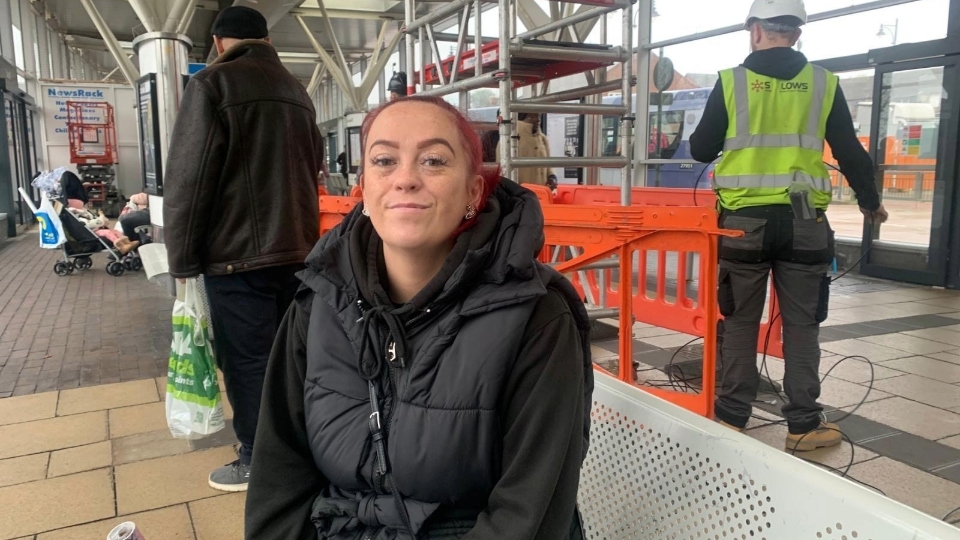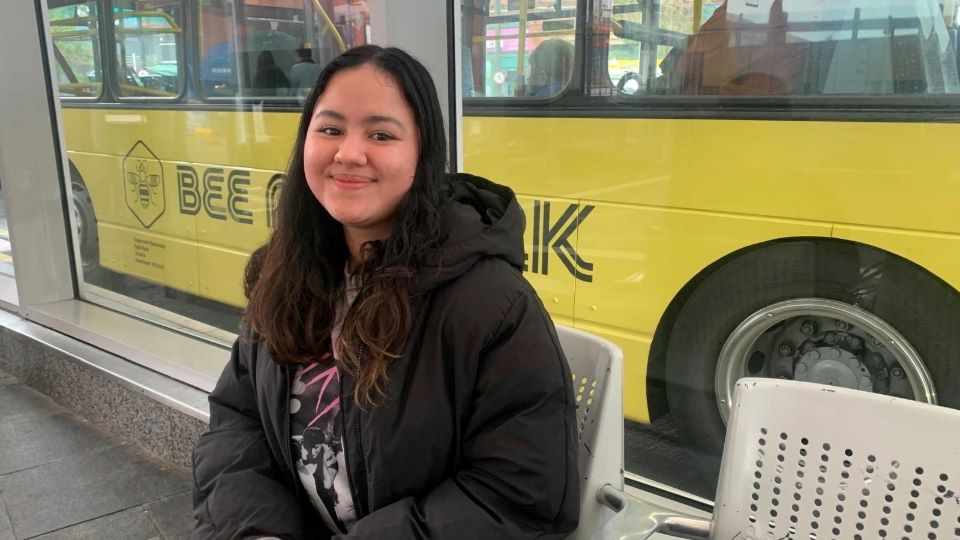Why Andy Burnham can keep his bus fare cap at £2 when England’s rises
Reporter: Charlotte Hall and Ethan Davies, LD Reporters
Date published: 29 October 2024

Natalie Hobson pictured at Oldham bus station
Mayor of Greater Manchester Andy Burnham delivered a major announcement on buses yesterday (Tuesday).
He confirmed Bee Network buses will continue to only charge £2 for an adult single journey, roughly 36 hours after the Prime Minister said the cap in the rest of England will rise from £2 to £3 next year.
Transport secretary, Lou Haigh, added the new cap was brought in because ‘we know that reliable, affordable bus services are vital to keeping Britain moving’.
The previous £2 cap was only funded until New Year’s Eve 2024 by the now-departed Conservative government.
Labour say failing to introduce a new 2025 cap would mean fares could surge, but needed to offer the taxpayer value for money.
Ms Haigh added: “That’s why the Government will cap fares at £3 for an additional year and provide over £1 billion to deliver better bus services.
“This will avoid a cliff-edge at the end of this year and keep fares affordable across the country - improving access to opportunities, particularly in towns and rural areas, while offering value for the taxpayer.”
But the mayor’s move means passengers here won’t have to fork out as much for a single journey in 2025, and that £2 might go even further when ‘hopper fares’ - which allow someone to take as many bus journeys as are necessary within an hour - are introduced on January 5.
That’s also the same date the rest of Greater Manchester’s privately-run bus routes come into public control, as 48 percent in the southern half of the city-region are taken over by the Bee Network.
And it’s the Bee Network which allows for lower fares, Greater Manchester transport chiefs say.
To explain how Manchester is doing things differently, the LDRS spoke to passengers and transport insiders on the £2 cap.
“That would be A LOT of money”: How have passengers reacted?
The news came as a relief to many bus passengers in Oldham, where beyond the tram route, vast swathes of the borough are completely reliant on the service.
“It’s great. I think everywhere should stay at two pounds,” Liam Hyde, 18, said.
He relies on buses to get to and from work, and the price rise would have made a ‘big difference’ to him.
“I just feel bad for everywhere else,” he went on.
“Six pounds if you went on two buses is crazy.
"That extra money could go on groceries and clothes.
"Public transport should be reliable and cheap for families.”
Another commuter, Natalie Hobson, 36, was waiting in Oldham’s interchange for a bus to work.
She agreed Mr Burnham’s decision was a ‘good’ one, but is worried about whether tickets will stay at £2 long-term.
Asked if the price hike would have impacted her, Natalie said: “Definitely. I don’t drive because my partner uses the car for work, so I rely on public transport.
"It would leave people out of pocket and they would really struggle.”
And Jennifer Ocampo, 21 (pictured below), who works and attends college in Oldham and is ‘always’ using buses, imagined what it would be like if her monthly student ticket - currently around £60 - went up by half like the price cap.

“That would be A LOT of money,” she exclaimed.
“That makes a big difference to people’s lives.”
Others were less bothered.
Tina, who was on her way into Manchester centre with her husband, thought the ticket price would still be a good deal either way.
“It would still be a set amount,” she said.
“We’re headed to Manchester now, and for £3, that’s still worth it.”
So why can Greater Manchester do what others cannot?
Put simply, Andy Burnham could keep his cap lower because it was funded from a different pot of cash to the other cap.
The ‘English cap’, set to end in two months and now being extended until December 2025 at £3, is paid for by a £151 million government fund called the National Bus Fare Cap.
Greater Manchester’s cap is funded by the £640m Bus Service Improvement Plan (BSIP) fund, which was guaranteed until the end of March.
It was extended in today’s (October 30) budget, and Greater Manchester chiefs say they are currently speaking to the government over how long that will continue.
They believe the city-region is in a different position to most as franchising will be completed by January 5, and ticket revenue from the first year of operation in the franchised areas is £3m higher than expected already.
That has given the mayor confidence a ‘low fare, high patronage’ model can work, prompting the decision to use Greater Manchester’s slice of the national £640m pie - the exact amount will be confirmed in the next fortnight - to keep fares at £2.
What did the mayor say?
Here is Andy Burnham’s announcement in full: “Greater Manchester is on course to complete the re-regulation of buses on time and on budget early in the New Year, becoming the first city-region outside London to put them fully back under public control after four decades of deregulation.
“Our policy aim throughout has been to create a low-fare, high-patronage system similar to the one that has brought higher growth and productivity to London.
"This will remain the mission of the Bee Network.
“On 5/1/25, we will proceed with our plan to introduce a new simpler, flatter fare structure based around a £2 single fare and, on 23/3/25, a contactless London-style payment system with a daily and weekly cap setting a maximum for what people pay when travelling on our buses and trams.
“Because of the decisions we have taken, and the progress we have made, GM is in a different position to other areas across England when it comes to bus funding and bus fares.
"We are beginning to benefit from similar financial advantages as those long enjoyed by London.
“Firstly, the per-kilometre cost of our new contracts are on average one third cheaper than tenders in the old deregulated system.
“Secondly, by taking control of the farebox, any profits from rising patronage can be kept and recycled for the benefit of GM residents rather than retained by private operators.
“Thirdly, control of the system allows us to take further steps to help our residents.
"For instance, by making annual Bee Bus Passes available through our 14 credit unions via weekly payments, residents can cut the cost of weekly bus travel by around £5.”
“We hope that the measures we are taking will continue the increase in patronage we have seen since the introduction of the original £2 cap in September 2022 and the launch of the Bee Network in September 2023.
"The more that people use the system, the easier it will be for us to sustain the low-fare structure.
“This said, it is only by the middle of 2025 when we have completed Phase 1 of the Bee Network, and we know the level of government funding we have, that we will be in a position to judge the financial outlook for the new system.
“So, based on the above, we can confirm that we are sticking with the £2 cap for the whole of 2025 but subject to a mid-year review.
“By maintaining this approach, we will continue to help our residents in these difficult times.
"While our plan has always involved asking for an increase in the Mayoral precept in financial year 25/26 on completion of the Bee Network, we are confident that our residents can recover the cost within a couple of weeks if they use the system as we hope they will.
“We understand it is easier and cheaper to maintain a £2 cap in a regulated system and expensive for the Government to subsidise it in a deregulated one, but they have maintained the principle of a cap.
"Greater Manchester was the first to propose the £2 cap in March 2022, introducing it in September that year ahead of the national £2 scheme, and we will keep it as long [as] we can.”
Do you have a story for us? Want to tell us about something going on in and around Oldham? Let us know by emailing news@oldham-chronicle.co.uk , calling our Oldham-based newsroom on 0161 633 2121 , tweeting us @oldhamchronicle or messaging us through our Facebook page. All contact will be treated in confidence.
Most Viewed News Stories
- 1Oldham’s new ‘timeshare’ boss, her six-figure-salary, and what it all means
- 2Police called after large stone is 'hurled through moving car window'
- 3Police appeal for information after woman is seriously injured in 'shocking' Royton attack
- 4Man sought as police probe continues following sexual assault on tram
- 5Why Andy Burnham can keep his bus fare cap at £2 when England’s rises




